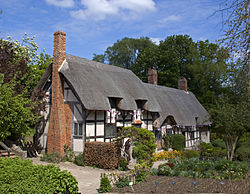| Anne Hathaway's Cottage | |
|---|---|
 Delphiniums, hollyhocks and dahlias in the "cottage garden" (2011) Delphiniums, hollyhocks and dahlias in the "cottage garden" (2011) | |
| General information | |
| Address | Shottery, Warwickshire, England |
| Coordinates | 52°11′26″N 1°43′53″W / 52.19065°N 1.7315°W / 52.19065; -1.7315 |
| Completed | 1463 |
| Renovated | April 1610 - October 1624 |
| Owner | Shakespeare Birthplace Trust |
| Technical details | |
| Structural system | Timber framing |
| Website | |
| www | |
Anne Hathaway's Cottage is a twelve-roomed farmhouse where Anne Hathaway, the wife of William Shakespeare, lived as a child in the village of Shottery, Warwickshire, England, about 1 mile (1.6 km) west of Stratford-upon-Avon. Spacious, and with several bedrooms, it is now set in extensive gardens.
History
The earliest part of the house dates to 1463, when it was still a three-roomed building with only one floor; the higher part is 17th century, being built between April 1610 and October 1624. The house was known as Hewlands Farm in Shakespeare's day and had more than 90 acres (36 hectares) of land attached to it; to call it a cottage is arguably a misnomer, as it is much larger than the term usually implies. As in many houses of the period, it has multiple chimneys to spread the heat evenly throughout the house during winter. The largest chimney was used for cooking. It also has visible timber framing, typical of vernacular Tudor architecture.
The Hathaway family moved there in 1542, with John Hathaway, grandfather of Anne Hathaway, being the first Hathaway to live there.
After the death of Richard Hathaway (father of Anne Hathaway) in 1581, the cottage was owned by Anne Hathaway's brother Bartholomew, who began to expand the building starting on 1 April 1610 and continuing until his death on 28 October 1624, and was passed down the Hathaway family until 1846, when financial problems, which began in 1700, forced them to sell it. However, it was still occupied by them as tenants when it was acquired in 1892 by the Shakespeare Birthplace Trust, which removed later additions and alterations; William Baker was the last to live in the property and he left when his mother Mary Baker died in 1911.
In 1969 the cottage was badly damaged in a fire, but was restored by the Trust. It is now open to the public as a museum.
Gardens
In 1920, horticulturist Ellen Willmott was commissioned by the Shakespeare Birthplace Trust to advise on design and planting in the garden around the cottage, following the introduction of a large sewer which destroyed the previous garden. Her designs for the flower garden and orchard were intended to complement the buildings. Many of the plants chosen were mentioned in Shakespeare’s plays, with pastel combination in borders that remain colourful throughout the year. Much of her layout and plant choices are in place today, including the three flower beds near the cottage entrance, named Miss Willmott’s garden.
Replicas

Full-size replicas of Anne Hathaway's cottage have been built around the world:
- Elizabethan Village, Bedfordale, Western Australia, Australia
- English Inn, Victoria, British Columbia, Canada
- Grove Park Inn, Asheville, North Carolina, United States
- Odessa College, Texas, United States
- Staunton, Virginia, United States
- Wessington Springs, South Dakota, United States
Sculpture Trail at Anne Hathaway's cottage and garden
-
History Play
by Jane Lawrence -
Titania and Bottom
by Gemma Smith -
King Lear
by Eve Pomerantz -
 Falstaff, What is Honour
Falstaff, What is Honour
by Niels Helvig Thorsen -
Hamlet: What Wilt Thou Do For Her
by Michele Firpo-Cappiello -
Brutus
by Isaac Graham -
Garden path
-
 Garden path
Garden path
References
- "Anne Hathaway's Cottage". Shakespeare Birthplace Trust.
- "Willmott, Ellen Ann (1858–1934), horticulturist". Oxford Dictionary of National Biography (online ed.). Oxford University Press. 2004. doi:10.1093/ref:odnb/48838. ISBN 978-0-19-861412-8. Retrieved 29 May 2022. (Subscription or UK public library membership required.)
- "Ellen Ann Willmott: a Woman of Horticultural Destiny". Shakespeare Birthplace Trust. Retrieved 29 May 2022.
- "Creation of the Cottage Garden". Shakespeare Birthplace Trust. Retrieved 29 May 2022.
- "Women in British garden history". Shakespeare Birthplace Trust. Retrieved 29 May 2022.
- Boyle, John (17 August 2022). "Philippine government stayed at Grove Park Inn during WWII?". Asheville Citizen-Times.
- "Hathaway Cottage Could Help Staunton Bring in Cash". WHSV-TV. Archived from the original on 27 June 2019. Retrieved 26 June 2012.
- "Welcome - Anne Hathaway Cottage Tea Room". Anne Hathaway Cottage Tea Room. Archived from the original on 13 November 2012. Retrieved 28 December 2012.
- "Shakespeare Garden & Anne Hathaway Cottage". 30 March 2015.